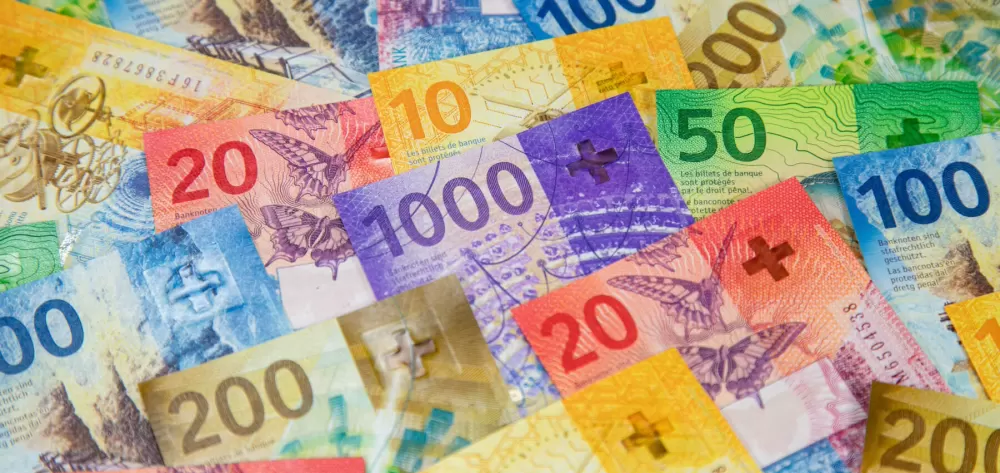Many investors dream about making large returns quickly. But the idea of getting rich quickly is usually unrealistic. You should always be wary of investments that offer very high yields, such as those advertised by dubious financial consultants on the Internet. Promises of fast returns are normally empty, and in the worst case, you can end up losing all of the money you invest.
But there are also serious investments that can potentially deliver high returns. In every case, the rule of thumb is that the higher the potential returns are, the higher the risk of losing money is. On the other side of the coin, investments with a low risk of loss generally deliver low returns. Below, moneyland.ch analyses seven popular investment vehicles and explains their profit potential.
1. Individual stocks
If you have a large risk capacity, then investing in individual stocks is an option. Unlike diversified investments, it is actually possible to double your wealth within just a few months or even in days.
If you had purchased Tesla shares at the start of 2023, you would have more than doubled your invested capital by the end of July (performance of 126 percent in US dollars). The stock of semiconductor maker Nvidia more than tripled in value since the start of the year as it rode the wave of euphoria surrounding artificial intelligence. Tupperware is another notable example of a stock that rapidly doubled in value. At the end of July, 2023, the value of Tupperware’s stock more than doubled within just two days. Important: There are, of course, also numerous examples of stocks whose value shrank enormously within short periods of time.
Huge climbs in the prices of individual stocks do happen from time to time, but massive price drops are also common. And the risk of investing in individual companies is not limited to short-term losses. The value of a company can also decline over long periods of time. In the worst case, a stock can become completely worthless. By contrast, with diversified investments (diversified ETFs, for example), the longer you hold the investment, the lower the risk of loss becomes.
You can easily buy and sell shares in the stocks of individual companies using a custody account at a bank, or with a brokerage account from an online stock broker. Pay careful attention to investment costs like custody and brokerage fees.
2. Stock ETFs
An exchange traded fund (ETF) is a passive investment fund that invests in many different stocks, which lowers your risk of losing money if individual companies perform badly.
Historically, broadly-diversified investments in the Swiss stock market have yielded much higher returns than conservative investment vehicles like savings accounts and medium-term notes. For example, if you had invested in the Swiss Performance Index (SPI) at the end of July, 2013, your invested money would have grown by 102 percent by the end of July, 2023. So within 10 years, you would have more than doubled your wealth.
At least in the short term, you have to accept a higher risk of loss compared to using conservative investment solutions like savings accounts. Even a broadly diversified portfolio of Swiss stocks – an ETF that tracks the SPI, for example – does experience severe losses in value from time to time.
In addition to diversification, a key requirement for investing successfully with ETFs is that you have a lot of patience and do not easily lose your nerve. These characteristics will help you wait out periods in which the value of your investments is low. The rule of thumb: Only invest in the stock market if you are able to keep your money invested for at least 10 years.
Buying and selling shares in ETFs is similar to buying and selling shares in companies’ stocks. You need a custody account at an online stock broker or at a bank. pay attention to fees and charges, and use the most affordable broker.
Returns and risks
Multiplying your money within a short period of time is only possible if you are willing to risk losing capital. Risk and returns are tightly correlated. The general rule of thumb is: Investments with higher potential returns are riskier, while investments with a lower risk of loss are less profitable.
3. Savings accounts
Savings accounts are the most conventional investment solution. You deposit money in a savings account at a bank. The bank normally pays you yearly interest for the use of your capital. Swiss banks generally do not charge basic account fees for savings accounts.
Savings account balances grow slowly and steadily, depending on the going interest rates, but the profit potential is low. If you were to use a savings account with the current average interest rate of 0.7 percent, it would take 100 years for your money to double – without accounting for inflation. You can check that figure using the moneyland.ch savings calculator.
The returns may be very low, but so are the risk levels. If you put your money in a savings account, your risk of losing wealth is negligible, compared to investing in stocks. Account balances are secured by the Swiss bank depositor protection scheme, up to 100,000 francs per bank and customer. Most Swiss cantonal banks even have state guarantees.
You can easily open a savings account at any Swiss retail bank. The savings account comparison makes it easy to find the accounts with the highest interest rates.
The rule of 72
How long does it take for an investment to double in value? The so-called rule of 72 provides a good basis for estimating the time it will take.
According to this rule, you can find the amount of time it will take for your capital to double by dividing the number 72 by the expected annual return. Example: If an investment yields a return of eight percent per year, your capital will double in value within nine years (72 divided by eight).
You can calculate the exact amount of time it would take to double your money using the savings calculator on moneyland.ch.
4. Roulette
Roulette is probably the best-known game of luck which has the potential to quickly and easily double your money, or cause you to lose it. To play the game, you bet on a simple chance. Either you bet that the ball will come to a stop on your choice of a red or black number, or your choice of an even or uneven number. There are 18 red numbers in total, plus zero.
If you play just a single round of roulette, the chance of doubling your wealth is 48.6 percent. The presence of the zero on the roulette wheel is the reason that your chances are below 50 percent.
The risk is obvious: You can lose the amount you bet just as quickly and easily as you can double your money. There is a 51.4 percent chance that you will lose money. Additionally, games of luck have the potential to become addictive, and so are best avoided.
Roulette is a standard fixture in casinos, including online casinos. moneyland.ch recommends against playing games of luck, as the risk of loss is higher than the chance of winning.
5. Day Trading
Apart from investing in individual stocks and ETFs, there are other ways to trade on financial markets that are much riskier. These trading methods promise high potential returns, but in reality, they often result in investors making substantial losses. Investment vehicles that are popular with day traders include contracts for difference (CFDs), forex, options, and futures.
When you use a CFD based on a stock, for example, you are betting on the performance of that stock. If you bet that a stock's price will climb, put down 1000 francs as collateral (the margin), and use a leverage ratio of 20:1, the value of your capital will double if the stock’s price increases by five percent – without accounting for the trading costs. If, on the other hand, the stock’s price falls by five percent, you will lose your 1000 francs of capital.
CFDs, forex, and other risky products usually use leverage to amplify the basic investment. That can potentially result in your capital being multiplied within a very short amount of time. But on the other hand, leverage also amplifies losses, meaning you can lose your entire invested capital within a very short amount of time. Depending on which investment vehicle you use, you could have to pay additional money on top. Frequent trading also generates high costs in the form of fees and charges. For most investors, passive investing is a more sensible approach.
In order to use high-risk investment vehicles, you have to have a brokerage account with an online trading platform that has the trading services you want.
A piece of sound advice
If you want to increase your wealth, you should focus on cutting down your expenses at least as much as on finding the most lucrative investments. It is usually much easier to cut out 1000 francs of unnecessary expenses than it is to earn 1000 francs of returns by investing. On moneyland.ch, you will find many comparisons and guides that can help you cut down on excess costs.
6. Gold
As a rare metal, gold has earned a reputation as a safe haven during times of crisis. Demand for gold as a store of value – particularly during periods of political and economic upheaval – has been present since a very long time ago.
The price of gold, in US dollars, nearly doubled between the end of 2015 and the middle of 2020. If you had gotten your timing just right, you could have doubled your wealth by holding gold for just over four years. Of course, good timing is a question of luck, so doubling your money this way requires a Midas touch.
Gold is often praised as a safe haven. But that reputation does not hold water because the gold price can fluctuate drastically. Historically, the stock market has delivered much better performance than gold investments.
You can buy gold in Switzerland from many Swiss banks, as well as specialized precious metal dealers. Pay careful attention to the markups which dealers charge on top of the spot price, and to the costs of storing your gold securely. Alternatively, you can also invest in gold using gold ETFs and precious metal accounts from Swiss banks.
7. Cryptocurrencies
Currently, cryptocurrencies are primarily a high-risk speculation vehicle. But on a small scale, cryptocurrencies are also used for their original purpose as a payment method, and for other purposes.
The value of cryptocurrencies can potentially skyrocket. In October, 2020, one bitcoin was worth around 10,000 francs. In December of the same year, a bitcoin was worth more than 20,000 francs. Just four months later in March, 2021, a bitcoin was worth more than 56,000 francs. But cryptocurrencies can lose value just as quickly as they gain it.
The example of bitcoin above clearly shows how closely intertwined risk and returns are. With a lot of luck, you can make a lot of money. But you can also lose a lot of money. While bitcoin rapidly gained value, its price has declined by more than 50 percent since it peaked at 59,000 francs in November, 2021. Other cryptocurrencies have been just as volatile. Unlike stocks, cryptocurrencies cannot be considered a dependable investment.
You can buy cryptocurrencies like bitcoin using certain Swiss cryptocurrency service providers.
More on this topic:
Compare Swiss online trading platforms now
Use the savings calculator now
Compare historical Swiss stock market returns and savings account interest now








